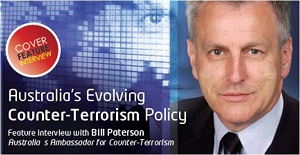APSM
Contributing Security Analyst on global strategic and security issues.
After 9/11, Australia’s Department of Foreign Affairs and Trade established the Anti-Terrorism Task Force to coordinate inter-agency responses to the emerging challenges of international terrorism. Bill Paterson was the first head of this task force and later, since 2004, has occupied the role of Australia’s Ambassador for Counter-Terrorism. The aim of this position is to coordinate Australia’s counter-terrorism engagement with countries where there are major terrorist issues at play and where Australia’s national interests are at stake.
Q: How would you describe your role as our Ambassador for Counter-Terrorism? In relation to the post 9/11 era, do you think there has been an overreaction to the threat of terrorism compared to the other security and societal threats in the region?
Bill Paterson: As Australia’s Ambassador for Counter-Terrorism, I negotiate agreements and consult with other countries, but a major part of my role involves coordinating with various Australian government agencies before implementing projects in other countries.
The overreaction to the threat of terrorism compared to the other security and societal threats is a question people are still wrestling with 11 years after 9/11. There’s no question what happened on 9/11 and in Bali seemed to present a serious security challenge that required a lot of resources to address. But of course it’s not the only security challenge that governments have to deal with and plan for – there are others, too. A decade after 9/11, we can see terrorism more properly in context. By and large, terrorism still has a very high profile and terrorist acts have a disproportionate impact. But for the most part, terrorism does not actually represent an existential or territorial challenge to Australia. Terrorism, we should recall, is a tactic and not a strategy. It’s a tactic towards a political end with the aim of maximising fear, uncertainty and disruption. So having a big impact – a disproportionate impact – is a key objective of terrorists. Terrorism is situated more as a significant security challenge today, but one that a number of governments have to deal with.
Q: How does the Australian government allocate and prioritise its resources for combating terrorism and preventing radicalisation in our region?
Bill Paterson: A bit of both is the answer. How do we prioritise? We have mechanisms within government whose particular responsibility is to recommend to government once a year what Australia’s international counter-terrorism priorities for the year ahead should be. It’s fair to say that more than a decade after 9/11 and the Bali bombings, we are continuing to raise the law enforcement focus to terrorism, remembering that terrorism is in essence a potent form of criminality. We are working on the longer term questions. How do we deal with the pathway to radicalism? Why do people join terrorist movements? How do we rehabilitate terrorists in prison? How do we ensure they will disengage from violence after release?
We are also putting effort into the de-radicalisation of terrorists. That might be an unrealistic objective, and radical views in democratic societies are certainly not illegal – they are often quite permissible. So I think we are getting to a more realistic appreciation of what needs to be done, and that means getting extremists to realise the futility of the violent path and to disengage. It was always going to be a difficult one and is likely to be quite resource intensive, too. It involves the application of psychology and a range of socio-economic measures within communities where terrorism has spread and where there is a sense of alienation, frustration, and low socio-economic indicators. Nobody as yet has the silver bullet answer to dealing with the problem of radicalisation. We are feeling our way on this internationally. The good news is that a lot of research has been done over the last decade that points to more intelligent approaches.
Q: Which countries in Southeast Asia are occupying Australia’s attention? What resources are being deployed to assist Indonesia and other Southeast Asian countries in countering terrorism and radicalisation?
Bill Paterson: That’s a bit difficult to answer because I’m not precisely aware at the moment of what individual agencies are doing. Even if I did, some of that information is not in the public domain. And it’s very hard to draw a line between developmental activity like the school building programme and specifically counter-terrorism directed activity. Increasingly, as we move beyond the issues of identifying, arresting, prosecuting and convicting terrorists, a lot of what we are doing in the counter-terrorism space is equally accountable as developmental, and likely to have a wider beneficial impact that extends beyond terrorism and into other socially useful fields. A range of Australian government agencies – the Australian Federal Police, the Australian Defence Force, the Australian Attorney-General’s Department – are working with Indonesia on policy areas that have some connection to security.
Australian interests in Southeast Asia, particularly in Indonesia, have been transformed over the last decade. To put that into perspective, we have lost 111 Australians in about nine major terrorist attacks internationally since 9/11. About 95 of the casualties have been in Indonesia, in the two Bali bombings, the hotel bombings in Jakarta, and the attack on the Australian Embassy. So we have been focusing on cooperating with Indonesia in developing a coherent capability to deal with terrorism. Much of the benefit and credit for what has been achieved has to go to the Indonesians themselves. At the time of Bali 1, the Indonesians didn’t have a lot of counter-terrorism capability. In policy terms, they have been very focused and effective at breaking up networks and arresting, prosecuting and convicting individuals.
We are concerned about terrorism in the southern Philippines particularly in the Mindanao area in the southern Philippines where the Moro Islamic Liberation Front and the Islamic Abu Sayyaf group are still operating and creating much disharmony and instability. That part of the Philippines is an area where quite a lot of Australians go for work or tourism and we are concerned about that. We have also been concerned with growing movement of terrorists between southern Philippines and Indonesia in the last decade, and that it may not have been entirely choked off.
Malaysia has had some security issues from time to time, and Singapore too has some threatening extremist elements. But both have been developing advanced counter-terrorism capabilities to track down extremists and neutralise them. The problem in Indonesia, the Philippines and Malaysia got a new lease of life when fighters returned after the withdrawal of the Soviet Union from Afghanistan in the late 1980s. Battle-hardened ideologues came back to the Philippines and Indonesia, and to Malaysia to an extent. Most of the networks have been broken up now and many of those people have been captured and locked up. The record for doing that in Indonesia is actually very good.
The insurgency in southern Thailand is by and large a local problem. It is a separatist insurgency with a specific local agenda. The insurgents have not built links with transnational terrorism, and their demands are aimed more at the Thai government in Bangkok. It is a concern because of the enormously high levels of violence there, the highest in the region actually. About 4000 people have been killed there over the past eight years, and the explosive devices are becoming more advanced and sophisticated. But the issues there really relate to the separatists’ agenda and seeking greater recognition of their ethnicity, religion and language in the Thai polity rather than participating in the global jihad.
Q: Australia has well over a dozen counter-terrorism MoUs with a number of countries in the Indo-Pacific region. What are the characteristics of Australia’s engagement with countries in South Asia?
Bill Paterson: These MoUs are important symbolic documents to demonstrate commitment between two countries and enhance the wrap-up and cooperation on counter-terrorism. We have MoUs with Middle Eastern and South Asian countries.
The main reason we deployed to Afghanistan was to support the United States and others to ensure that Pakistan was no longer a haven for al Qaida and other related groups. What drew us into Afghanistan is the reason we are still there. You can deal with Afghanistan only if you work closely with Pakistan, and Australia has ramped up its police and military cooperation with Pakistan to help it build its capability. This is indeed a tricky problem, not least because of the demography and in that part of the world. I have flown in a helicopter in both countries and seen how difficult these areas are to operate in. The United States and some of its partners have indicated that they intend to maintain a presence in Afghanistan to deal with terrorist incidents there. The Australian Government may be part of that – but that’s yet to be decided by the government – although we have indicated that we may continue to have a post-2014 role in Afghanistan. If all works well, we will focus on supporting the Afghan government in dealing with the counter-terrorism challenge. As we do with several other countries, we will seek to work more with civilians as we draw down our military role.
Most South Asian countries have had significant terrorist issues—and still do. One bright spot is Bangladesh, a country with a number of economic challenges and some domestic extremism. In recent times, Bangladesh has cut off ties with external groups who want to use it as a transit point. Australia has a MoU with Bangladesh and we cooperate well with them. Although fairly limited, we’ve engaged in some cooperative activities with Bangladesh over the years. More recently, we have been working with Bangladesh to establish a law enforcement training centre with a focus on counter-terrorism. This training centre will draw on the success and expertise of a similar institute that Australia has established in Indonesia. The Jakarta Centre for Law Enforcement Co-operation has been highly successful and is becoming something of an international model.
We have a dialogue on counter-terrorism with India and we do cooperate with them. We have worked with the Indian police, prosecutors and judges in workshops through our work with the United Nations Counter-Terrorism Directorate. Our police liaise with their Indian counterparts. But India is a big country with a lot of capabilities to deal with these issues. Our focus has been on countries where that capability is less well developed and where a small contribution can have a big impact.
Q: Australian interests in Africa have increased in the last decade with growing investment and diplomatic linkages. How will this reflect upon our nation’s counter-terrorism focus in relation to the continent?
Bill Paterson: We cannot be all things to all people. We have limited resources and our focus is going to be Southeast Asia. In recent years, many of our European partners have focused more than Australia on North Africa – we are sharing the burden. We are concerned about growth in terrorism-related activity across north and west Africa, and we are concerned that the growing Australian presence in Africa potentially puts some of those interests at risk. But the way we are involved in Africa is by helping our European and other partners in building better counter-terrorism legislation and better prosecutorial and judicial capabilities in the region. We have been doing a number of workshops and seminars over there, but our role is likely to remain limited.
Q: In retrospect, how do you evaluate the effectiveness of Australia’s counter-terrorism strategy? What are your views on our perceived future threats?
Bill Paterson: Our initial response to terrorist attacks in Indonesia was to deal with the immediate problem, and to develop a basis for cooperation with the Indonesian government by enhancing their capabilities to identify and to apprehend terrorists. A decade on, we are looking to work with them on the management and rehabilitation of terrorist prisoners, and the socio-economic factors that lead to terrorism. There is an AusAid programme in Indonesia that builds schools. It is a very good programme, and even though it has nothing to do with counter-terrorism, it could well have a significant counter-terrorism impact.
In the first stage of the program, 2,000 or so schools were built, 300 of which are expressly Islamic schools, but closely tied to the national curriculum. These students will get a solid grounding in a range of secular subjects, as well as, religious instruction, which will better validate and enable them to get employment and take their place in society. This programme is entirely developmental and not directed at counter-terrorism. But once these people have a job and a stake in society, they will be less likely to go down the path of extremism.
Indonesia has made impressive strides in building capability to deal with extremist activity. But we shouldn’t be too surprised about this: it is the world’s largest Muslim country and there are obviously wide disparities in education and prosperity – factors that can contribute to the growth of extremism. Australia’s interests are best served by working steadily and over the long term with Indonesia. This is to sustain and further develop their capability to address not just the law enforcement aspects of extremism, but the rehabilitation and factors that sustain extremism.
It’s fair to say that the problem of terrorism has been to some extent brought under control, but it’s also a persistent problem that is likely to endure. In Indonesia, for instance, there is some evidence that although Jemaah Islamiyah and the bigger groups have broken up, there is still recruitment into small cells; some of the conditions that can give rise to terrorism still exist; and an extremist publishing industry and a measure of religious intolerance are still prevalent in Indonesia – factors that are conducive to some continuation of extremist activity.
The different sorts of terrorism that we’re dealing with now are different to what we were dealing with over the previous decades. This terrorism is global and ambitious, and to some extent powered by globalisation. In the modern era, air travel, communications, the internet – this off-the-shelf technology – all have empowered a different and new generation of terrorists. We are facing a new set of challenges, and political causes and political groups may well take advantage of that too. We’re dealing with a terrorism that has sometimes been described as Islamist terrorism in a fringe area of Islam, but a lot of the terrorism capabilities could be applied to other political causes.
Terrorism won’t go away – it’s a technique and tactic that’s been around for centuries. So as one of a number of security issues that we have to deal with, terrorism is going to be around for a lot longer. We have pre-empted at least four major terrorist attacks in their planning stages in the last decade in Australia. We can’t expect to be immune from terrorism, but we are fairly confident that we have built decent counter-terrorism pre-empting capabilities to deal with terrorism in Australia. A number of Australians who have gone overseas and engaged with terrorist groups could potentially bring those skills and commitment back to Australia. So it’s important that we maintain a capability to address that and never be complacent. We have to maintain capability and vigilance in the long term.






